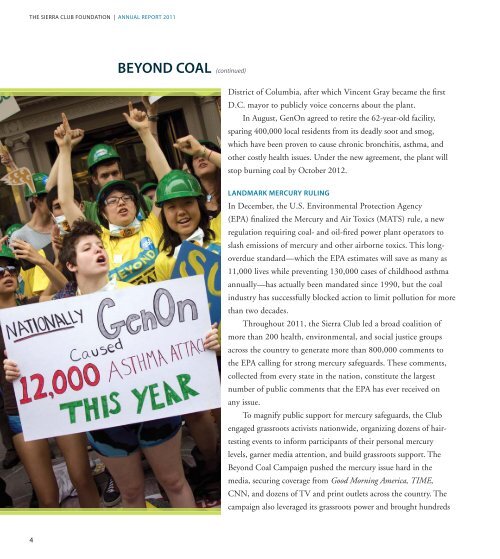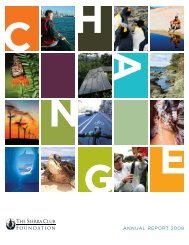The Sierra Club Foundation Annual Report 2011
The Sierra Club Foundation Annual Report 2011
The Sierra Club Foundation Annual Report 2011
Create successful ePaper yourself
Turn your PDF publications into a flip-book with our unique Google optimized e-Paper software.
THE SIERRA CLUB FOUNDATION | ANNUAL REPORT <strong>2011</strong><br />
BEYOND COAL (continued)<br />
District of Columbia, after which Vincent Gray became the first<br />
D.C. mayor to publicly voice concerns about the plant.<br />
In August, GenOn agreed to retire the 62-year-old facility,<br />
sparing 400,000 local residents from its deadly soot and smog,<br />
which have been proven to cause chronic bronchitis, asthma, and<br />
other costly health issues. Under the new agreement, the plant will<br />
stop burning coal by October 2012.<br />
LANDMARK MERCURY RULING<br />
In December, the U.S. Environmental Protection Agency<br />
(EPA) finalized the Mercury and Air Toxics (MATS) rule, a new<br />
regulation requiring coal- and oil-fired power plant operators to<br />
slash emissions of mercury and other airborne toxics. This longoverdue<br />
standard—which the EPA estimates will save as many as<br />
11,000 lives while preventing 130,000 cases of childhood asthma<br />
annually—has actually been mandated since 1990, but the coal<br />
industry has successfully blocked action to limit pollution for more<br />
than two decades.<br />
Throughout <strong>2011</strong>, the <strong>Sierra</strong> <strong>Club</strong> led a broad coalition of<br />
more than 200 health, environmental, and social justice groups<br />
across the country to generate more than 800,000 comments to<br />
the EPA calling for strong mercury safeguards. <strong>The</strong>se comments,<br />
collected from every state in the nation, constitute the largest<br />
number of public comments that the EPA has ever received on<br />
any issue.<br />
To magnify public support for mercury safeguards, the <strong>Club</strong><br />
engaged grassroots activists nationwide, organizing dozens of hairtesting<br />
events to inform participants of their personal mercury<br />
levels, garner media attention, and build grassroots support. <strong>The</strong><br />
Beyond Coal Campaign pushed the mercury issue hard in the<br />
media, securing coverage from Good Morning America, TIME,<br />
CNN, and dozens of TV and print outlets across the country. <strong>The</strong><br />
campaign also leveraged its grassroots power and brought hundreds<br />
4






